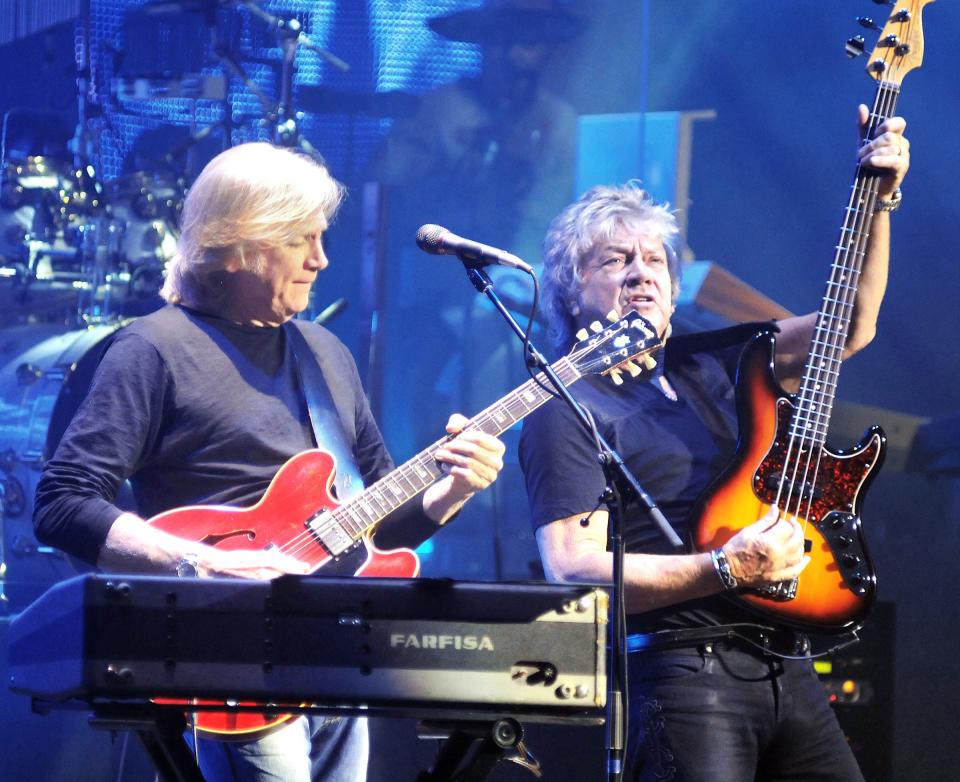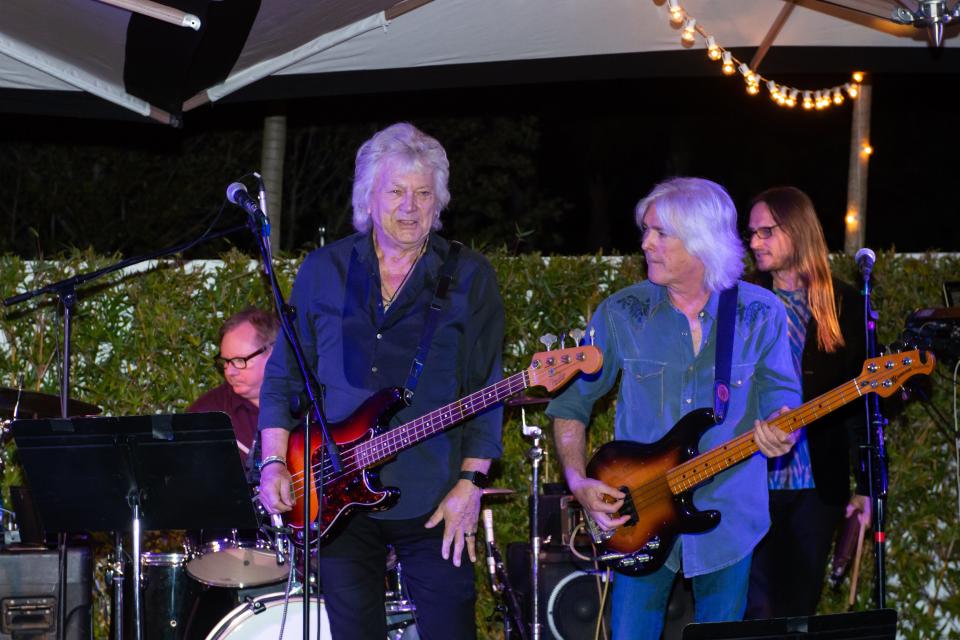Moody Blues bassist John Lodge reflects on how 'Nights in White Satin' changed everything
- Oops!Something went wrong.Please try again later.
- Oops!Something went wrong.Please try again later.
John Lodge has vivid memories of the day he and his fellow Moody Blues experienced the majesty of "Days of Future Passed," a 1967 concept album widely held to be their masterpiece, in full.
The bandmates had recorded their original material, including such classics as "Nights in White Satin" and "Tuesday Afternoon," in separate sessions from the orchestral arrangements Peter Knight had written for the London Festival Orchestra to weave around the Moody Blues' recordings to create a symphony of sorts.
So they set up a listening party in the studio, inviting friends and girlfriends, label reps and DJs out to hear the finished product.
"We put speakers in the actual studio, not the control room," the bassist recalls. "I remember listening, thinking, 'Well, what's this?' And when it finished, there was almost a silence in the room. I think we were all stumped, to be honest."
Then, they played it back a second time.
"And it was only after the second time," Lodge says, "that we burst out cheering and laughing, saying, 'Yep. That's it. We've done it.' Never thinking about the commercial success. We were just thinking, 'We've done it. We've done what we set out to achieve.'"
Remembering Jack Curtis: Why Alice Cooper calls this Phoenix teen-club impresario 'our patron saint'
'Days of Future Passed' was a sea change for the Magnificent Moodies

The symphonic grandeur of that album marked a stunning transformation from the sound of their previous effort, 1965's "The Magnificent Moodies."
That debut had been recorded when the Moody Blues were very much a British beat group wearing matching suits and covering R&B songs.
That all changed when Lodge and Justin Hayward joined in 1966.
"Our first meeting was that we were gonna get rid of the rules they had before we joined," he says. "No cover versions, no dressing the same, just being who we are as individuals, writing our own music."
It was time to leave the R&B behind.
"We were doing the blues and we'd never been to America," Lodge says.
"So it could only be a facsimile of the real thing. We thought about it and we said, 'What is the blues?' It's about growing up where you grew up. That's how we developed. We said, 'Well, let's write about ourselves and how we grew up, what affected us and what the world means to us."
'Funky Broadway': How one night at a Phoenix Elks Club changed the history of funk
Trading piano for Mellotron, the Moody Blues hit the studio

It wasn't long before they'd landed on a new sound, inspired in part by keyboardist Mike Pinder switching from piano to an instrument that would go on to play a key role in the music of the psychedelic era.
"Mike realized the piano wasn't the right sound for us," Lodge says. "We tried Hammond organs. We tried Vox Continentals, Farfisa organs, Rhodes pianos. Nothing seemed to fit. This is all over about three months.
"And then Michael remembered this instrument called the Mellotron, which he'd worked on earlier. So we went to Birmingham and bought one."
Pinder went to work replacing parts and fine-tuning the instrument to how he wanted it to sound, Lodge says. "And he became a master of the Mellotron, which drove everything together for the Moody Blues."
They were thrilled to get into the studio to work on "Days of Future Passed."
"Getting in the studio in those days was really difficult because it was always 10-2, 2-6 or 6-10," Lodge says.
"We told the record company, 'We want a 24-hour-a-day studio lockout.' I think we were the first band to ever ask for this. And they said yes. How good is that? To any aspiring musician? It's brilliant."
'We tried to find the good music': How one woman put KDKB on the Phoenix map in the '70s
The slow rise of 'Nights in White Satin'

"Days of Future Passed" was a moderate success at first and slowly gathered steam through years of FM airplay on "Nights in White Satin," a single written and sung by Hayward with Pinder reciting a spoken-word poem by drummer Graeme Edge.
By the time the album peaked at No. 3 here in the States, the Moody Blues had long since moved on, recording six more albums.
"Three months later, we're back in the studio making another album, 'In Search of the Lost Chord,'" Lodge recalls.
"We toured America the year after. And when we got back from the tour, we went in the studio and started 'Threshold of a Dream.' So everything was like waves on the ocean, really — one wave after another breaking on the shore. We didn't really stop to think about the albums we'd already made."
As "Days of Future Passed" was peaking in the States, the Moody Blues released their first chart-topping U.S. album, "Seventh Sojourn," which featured a hit single written and sung by Lodge, "I'm Just a Singer (In a Rock and Roll Band)."
Why the Moody Blues went on hiatus after hitting No. 1
Then, at the absolute height of their fame, they decided to go on hiatus.
"When we first started, we were five guys and a road manager in a van," Lodge says.
"By 'Seventh Sojourn,' we've got touring companies, record companies, publishing companies. We had so many people working for us, we couldn't get together to create music. When we did get together, we started talking about business, not music. And that sort of grew inside our psyche."
The Moody Blues returned to active duty three years after going on hiatus to start working on an album titled "Octave." Pinder quit before they finished tracking and his bandmates soldiered on without him, recruiting Patrick Moraz of Yes as their new keyboard player.
When 'Your Wildest Dreams' and 'The Voice' took them back to No. 1
The '80s got off a promising start when the "Long Distance Voyager" album, recorded with Moraz, topped the U.S. charts and ushered in another wave of big hit singles in the States, from "Gemini Dream" and "The Voice" to "Your Wildest Dreams" and "I Know You're Out There Somewhere."
"When 'Long Distance Voyager' hit the top in 1981, we were riding high with a new generation of music," Lodge says. "You had pop, punk and everything else and there was the Moody Blues back with a platinum No. 1 album. It was a great time because we were back in the arenas."
The Moody Blues' final performance was their 2018 induction to the Rock & Roll Hall of Fame, an honor Lodge says didn't really hit him until the night of the induction ceremony.
"Up until the actual ceremony, I viewed it, I think, as an Americanism and part of American culture," he says.
"But on the night, I realized in a way that I was part of American culture somehow. And my grandson was in the audience. I thought, 'How cool is that?' I'm accepting an award and my grandson's watching me. When he gets older, he can walk around the Hall of Fame and say, 'Hey, that was my granddad.'"
He also realized it felt pretty cool to be enshrined in the same Hall of Fame as Buddy Holly.
"I was on stage when all this was going on," he says. "I'm thinking, 'This is cool. This guy, me, a working class guy from Birmingham, and I'm gonna be standing next to my ultimate hero Buddy Holly in the Rock & Roll Hall of Fame. We're gonna be standing shoulder to shoulder."
Lodge is touring 'Days of Future Passed' in 2023
These days, Lodge is re-exploring "Days of Future Passed” on a tour that made its way through Phoenix in July for a show at the Celebrity Theatre with a special video of Edge, who died in 2021, reciting his poem and additional vocals by Jon Davison of Yes.
"What I've tried to do is to stay absolutely truthful to the original album, so all the songs are in the same key, which is really important," he says.
He'll also do a set of other well-known Moody Blues songs, including all the hits on which he sang lead as well as tributes to his bandmates as he continues in his quest to "keep all the Moody Blues music alive."
He's especially fond of seeing Edge recite his poem every night.
"It sends a shiver up my back to see Graeme on the video narrating his poetry," he says.
How 'breathe deep the gathering gloom' became part of the culture
As to how Edge's poem, which sets the tone with "Breathe deep the gathering gloom/ Watch lights fade from every room," became part of the tapestry of "Days of Future Passed," Lodge explains.
"When we were coming to the end of the album, we thought, 'We need something to cement it all together,'" he says.
"And Graeme was a great reader of books and a great poet. We said, 'Graeme, come on. Just think about this album and sew it all together so it's seamless.' And he did. It's one of the great poems, I think, of the rock 'n' roll era."
Lodge recalls a recent reminder of just deeply that poem has become ingrained in the cultural fabric.
"I was playing golf," he recalls. "And my ball, it went into the trees. So I'm looking for it.
"And Bryant Gumbel — you know, the sports commentator — he's in the trees helping look for the ball. But I don't see him. And suddenly, I hear, 'Breathe deep the gathering gloom.' It's Bryant Gumbel. I thought, 'Yeah, our poem really has reached everyone."
John Lodge in concert
When: 7:30 p.m. Wednesday, July 25.
Where: Celebrity Theatre, 440 N. 32nd St., Phoenix.
Admission: $35-$85.
Details: 602-267-1600, celebritytheatre.com.
Reach the reporter at ed.masley@arizonarepublic.com or 602-444-4495. Follow him on Twitter @EdMasley.
Support local journalism. Subscribe to azcentral.com today.
This article originally appeared on Arizona Republic: How 'Nights in White Satin' changed everything for the Moody Blues

